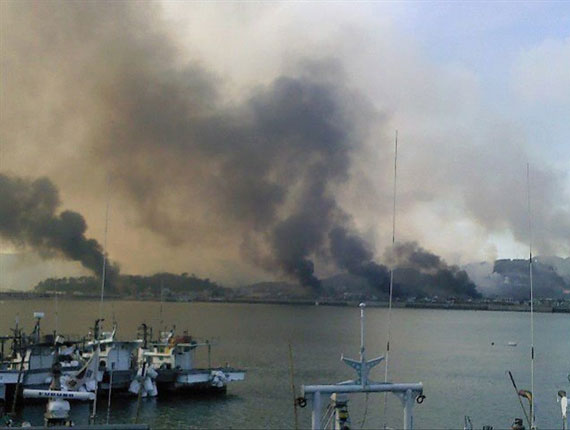 A háború küszöbén a két Korea? Ma reggel az észak-koreai tüzérség ágyúzott egy dél-koreai szigetet.
A háború küszöbén a két Korea? Ma reggel az észak-koreai tüzérség ágyúzott egy dél-koreai szigetet.Ez meg egy tegnapi cikk: Egy hét van még hátra a III. világháborúig, Nostradamus szerint.
 A háború küszöbén a két Korea? Ma reggel az észak-koreai tüzérség ágyúzott egy dél-koreai szigetet.
A háború küszöbén a két Korea? Ma reggel az észak-koreai tüzérség ágyúzott egy dél-koreai szigetet.
a 2. világháborúban ez volt a japán birodalom. Nézd már meg kína és a többihez képpest mekkora, és hogy leigázta fél ázsiát. A háborúhoz nagyon értettek, és ez meglátszott azon is ahogy többszörös túlerő ellen rendezkedtek be. Ezért volt pl az amerikaiaknak durván nagy a halottak száma. Kicsit lenézték őket mert többen vannak, aztán jött a pofáraesés.
"The election of Katō Komei as Prime Minister of Japan continued democratic reforms that had been advocated by influential individuals on the left. This culminated in the passage of universal male suffrage in March 1925. This bill gave all male subjects over the age of 25 the right to vote, provided they had lived in their electoral districts for at least one year and were not homeless. The electorate thereby increased from 3.3 million to 12.5 million"
tehát akkor még nem voltak olyan sokan mint manapság.
"Civilian deaths and suicides
As the tide of war turned against the Japanese, Hirohito personally found the threat of defection of Japanese civilians disturbing because there was a risk that live civilians would be surprised by generous U.S. treatment.[24] Native Japanese sympathizers would hand the Americans a powerful propaganda weapon to subvert the "fighting spirit" of Japan in radio broadcasts. At the end of June 1944 during the Battle of Saipan, Hirohito sent out the first imperial order encouraging all Japanese civilians to commit suicide rather than be taken prisoner.[24]
The Imperial order authorized Lieutenant General Yoshitsugu Saito, the commander of Saipan, to promise civilians who died there an equal spiritual status in the afterlife with those of soldiers perishing in combat. General Tojo intercepted the order on 30 June and delayed its sending, but it was issued anyway the next day. By the time the Marines advanced on the north tip of the island, from 8–12 July, most of the damage had been done.[24] Over 10,000 Japanese civilians committed suicide in the last days of the battle to take the offered privileged place in the afterlife, some jumping from "Suicide Cliff" and "Banzai Cliff".[25][26]"
http://en.wikipedia.org/wiki/Emperor_Hirohito innen vannak az infók pl.
Egyébként szeretek ilyenekről vitatkozni mert ilyenkor utánnaolvasok amire emlékszek és hát ha ezt elolvasod akkor el lehet gondolkozni mennyire gondolkoztak a japánok akár civilek, vagy katonák a halálról, öngyilkosságról. Persze olyan nép hogy meglátták az oroszokat és összecsinálták magukat. Ez szép orosz propaganda max de nem a valóság. Nagyobb dicsőség volt nekik meghalni a hazájukért, mint menekülni, menteni ami menthető. Akkor már inkább öngyilkosok lesznek.